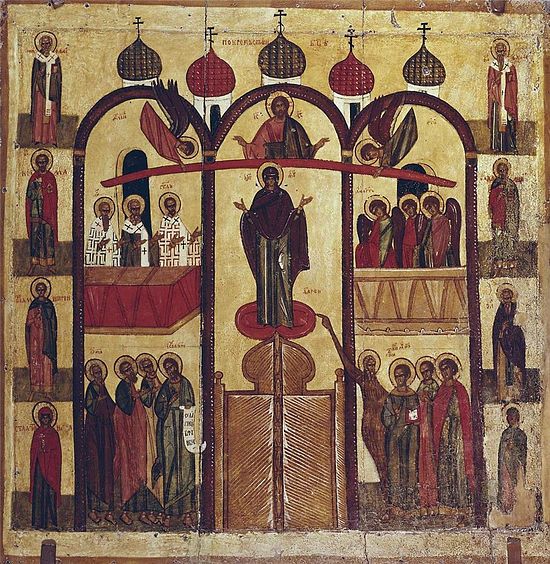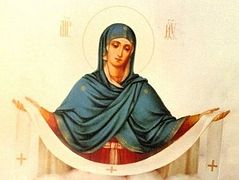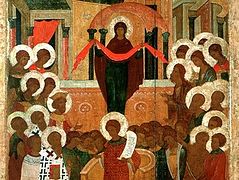In the name of the Father, and the Son, and the Holy Spirit!
Today the Holy Church, in Russia and in a small number of Russian Orthodox parishes around the world (this is basically a purely Russian feast), celebrate the day of the Protection of the Most Holy Mother of God. Most of us know that this feast had its origins in Greece, in Constantinople. In the Blachernae Church, St. Andrew the fool-for-Christ, a famous ascetic in Constantinople at the time, saw during the services how the Mother of God stood over all the faithful, holding her Protecting Veil in her arms in the form of a bishop’s omophorion, invisibly covering each of those who were praying in the church—each person striving and yearning for God with all his soul. Only two people saw this with their spiritual eyes: Andrew the fool-for-Christ and his disciple, while the rest prayed as before, standing piously and listening to the words of the prayer. But what a difference there was between the two who saw the Most Holy Mother of God and all of us, who stand with faith in the church, whose souls are lifted up to God by faith?
In each of our lives there has probably been a supernatural experience, one or even several, which has caused us to believe without a doubt in the existence of the spiritual world, in the reality that the Lord God, the Unfathomable Being, the Ruler and Master of the world governs all human fate and guides human beings in this world; and not only here, in this temporary life but also unto life eternal. Before Him each one of us bears responsibility for the lives we’ve lived, for each deed and every thought that we brought into this world. Nevertheless, there is a great difference between an ascetic of piety, a chosen one of God who lives in the reality of the spiritual world, and us who only from time to time have been vouchsafed special revelations, special awakenings. What is the mystery here, and in what lies our unworthiness and insufficiency?
We have come today to God’s church in order to bring our sacrifice to God—repentance, prayer, candles. What more can a person give to God? In general, communion between God and man can only be on one level—the level of sacrifice. Here in our church is the table of oblation to God, on which God brings His own Self as a sacrifice to us—His whole Self, just as He offered the great sacrifice on Golgotha, when the Lord Jesus Christ humbled Himself; the Divinity humbled Himself to the state of a man and gave Himself entirely as a sacrifice of love to us in order to bring us out of the state of death into the state of eternal life to which we are called.
We all know about Christ’s sacrifice and all live by this sacrifice, but the Lord awaits our own sacrifice. Only sacrifice—the most important and precious that we take from ourselves and give to someone else—is a true gift and true sign of love.
Modern man, to our great misfortune, is basically incapable of sacrifice. We do not have the resolve to cut off our own habits, which work contrarily to Christ’s commandments, hinder our communion with God, and which are empty or harmful to us. But they are just too habitual for us, to dear to our passions. And we cannot bring these weaknesses, infirmities, sins, habits, and mainly, our laziness as a sacrifice to God, cutting them off from ourselves. But the Lord is waiting precisely for this.
So, people come to the Church, and during their first years are amazingly fruitful and strong in their spiritual life, getting to know God, coming to Church and beginning to live a new life. Why? Because their initial zeal gave them the strength to bring their former habits and connections, their former lives as a sacrifice to God; and in exchange the Lord gave them amazing grace and spiritual strength, an amazing awakening and communion with Himself. But later, when this turns into an ordinary, everyday state, a norm, new sacrifices are required from us, only now we bring them with increasing difficulty. From this the Christian’s life becomes less fruitful and more tedious. He understands—intuitively and through the experience of his past life—that this is the right path, but he can’t renounce what he knows he should renounce. He understands he needs to bring his weaknesses and laziness as a sacrifice to God, and then a strong and new spiritual life will begin; but nevertheless, Orthodox Christians take these steps with enormous difficulty. And it often happens that a person remains in a duplicitous state until his very death, not having the strength to step over his own pride, through his habits of laziness, luxury, and pleasure, which as it seems to him are not so terribly sinful... But in order to embark upon a new spiritual step, in order to cut off our passions, this sacrifice is necessary.
Andrew the fool-for-Christ was just such a man, who dedicated his whole life to the greatest of arts, as the holy fathers write, the science of sciences—communion with God. And he gradually cut off all that stood between him and God: passions, pride, and self-opinion, and the praise of men. And he was the one worthy to see the Most Holy Mother of God, which was only one of the revelations given to him. St. Seraphim of Sarov, the Optina Elders, the saints of our times upon which we orient ourselves in our spiritual lives—all of them lived and live by constant sacrifice, offering themselves as sacrifices to God.
These words sound terrifying to a person of externals, who has not yet come to know what divine love is. But let’s think about these words. Every person, for example, a husband who offers something very important to him as a sacrifice to his wife, will understand how he enriched himself, how he profoundly came to know the loftiness of their relationship. This is what a mother begins to understand when she sacrifices her hours, days, and strength, tearing her very last away for the sake of her child, and finds happiness in this. Every Christian who is able to rise up to the state of communion with God understands this, and in this he finds the true happiness of his abiding on earth—and in not those unfortunate pseudo-happinesses that crash away before his passing from temporary life into life eternal.
May the Lord grant us also to rise up to this spirit of the saints, at least in some part; may the Lord grant us to understand the mystery that the Savior tells us about: I want mercy and not sacrifice. That is, to rise to that spiritual level when the sacrifice we ourselves bring to God will be as mercy, as happiness and joy. Few are capable of this, but each of us is called to it. Amen.





